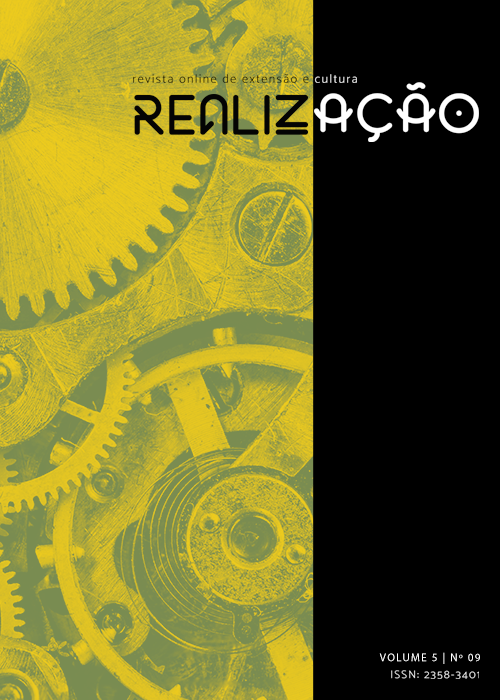Comparison between the water quality index and a rapid assessment protocol in two urban streams in the municipality of Naviraí, MS
DOI:
https://doi.org/10.30612/re-ufgd.v5i9.8583Keywords:
Lotic environments , Habitat diversity , Amambai riverAbstract
Water quality is decreasing due to human activities, mainly agriculture and urbanization. In this context, there is a need to assess water quality through efficient and economical tools. Thus, this study aimed to estimate the Water Quality Index and compare it with the Rapid Habitat Diversity Assessment Protocol in two urban streams. Eight points were sampled in the microbasins of the Cumandaí and Tarumã streams, Amambai River. The Water Quality Index was performed using the variables dissolved oxygen, pH, temperature, turbidity, BOD, E. coli, total dissolved solids, nitrogen and total phosphorus. The Rapid Habitat Diversity Assessment Protocol was used. It was possible to verify that the Water Quality Index (WQI) varied between 46 and 57, and the Rapid Assessment Protocol varied between 37 and 72. The results obtained for the water quality index and for the rapid assessment parameter are statistically equivalent. However, it is worth highlighting that the methods are complementary, that is, they must be applied together.
Downloads
References
CALLISTO, M.; FERREIRA, W. R.; MORENO, P.; GOULART, M. & PETRUCIO, M. Aplicação de um protocolo de avaliação rápida da diversidade de habitats em atividades de ensino e pesquisa (MG-RJ). Acta Limnologica Brasiliensia, v.14, n.1, p. 91-98, 2002.
HANNAFORD, M.J; BARBOUR, M.T. & RESH, V.H. Training reduces observer variability in visual-based assessments of stream habitat. Journal North American Benthoological Society, v.16, n.4, p. 853-860, 1997.
MORAIS, P.B., MARQUES, O.B., BESSA, G.F., SOUSA, F.M.P., MELO, W.G.P. O uso de Protocolo de Avaliação Rápida (PAR) para avaliação da integridade ambiental de um trecho urbano do Córrego Sussuapara, Tocantins, Brasil. Revista Ibero-Americana de Ciências Ambientais, v.6, n.2, 2015.
R Core Team. R: A language and environment for statistical computing. R Foundation for Statistical Computing, Vienna, Austria. 2015. Disponível em <https://www.R-project.org/>. Acesso em 28/05/2018.
SOUZA, A.C., REIS, T.D.F., SÁ, O.R. Comparação entre o Índice de Qualidade da Água (IQA) com o Protocolo de Avaliação Rápida de habitats no córrego Liso, município de São Sebastião do Paraíso, Minas Gerais. Fórum Ambiental Paulista, v.20, n.2, p. 392-409, 2014.
Downloads
Published
How to Cite
Issue
Section
License
Copyright (c) 2018 Ana Paula Lemke, Kellen Natalice Vilharva, Yzel Rondon Súarez

This work is licensed under a Creative Commons Attribution-NonCommercial-ShareAlike 4.0 International License.
Autores que publicam nesta revista aceitam as normas de publicação, bem como, concordam com os seguintes termos:
(a) O Conselho Editorial se reserva ao direito de efetuar, nos originais, alterações da Língua portuguesa para se manter o padrão culto da língua, respeitando, porém, o estilo dos autores.
(b) Autores mantêm os direitos autorais e concedem à revista o direito de primeira publicação, com o trabalho simultaneamente licenciado sob a Creative Commons Atribuição-NãoComercial-CompartilhaIgual 4.0 Internacional que permite: Compartilhar — copiar e redistribuir o material em qualquer suporte ou formato e Adaptar — remixar, transformar, e criar a partir do material. A Creative Commons Atribuição-NãoComercial-CompartilhaIgual 4.0 Internacional considera os termos seguintes:
- Atribuição — Você deve dar o crédito apropriado, prover um link para a licença e indicar se mudanças foram feitas. Você deve fazê-lo em qualquer circunstância razoável, mas de nenhuma maneira que sugira que o licenciante apoia você ou o seu uso.
- NãoComercial — Você não pode usar o material para fins comerciais.
- CompartilhaIgual — Se você remixar, transformar, ou criar a partir do material, tem de distribuir as suas contribuições sob a mesma licença que o original.
- Sem restrições adicionais — Você não pode aplicar termos jurídicos ou medidas de caráter tecnológico que restrinjam legalmente outros de fazerem algo que a licença permita.


